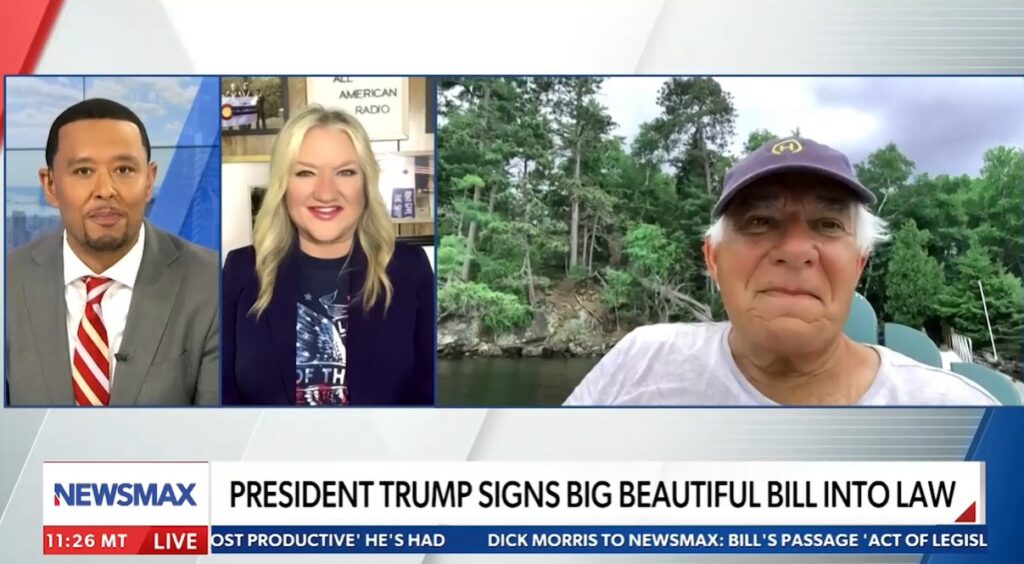Former U.S. Senator on Sunday Agenda with TW Shannon About State of Political Parties
On Sunday Agenda, Newsmax hosted a wide-ranging and pointed discussion on the state of American politics, featuring former U.S. Senator Robert Torricelli and political analyst Jennifer Kelly. The conversation, moderated by the network’s anchors, dove into the current identity crises facing both the Republican and Democratic parties, the 2024 election aftermath, and the eroding trust in institutions that has reshaped the political landscape.
Senator Torricelli, a Democrat known for his moderate stance and willingness to critique his own party, began by addressing the Democratic Party’s struggle to maintain unity across generational and ideological lines. He pointed out that while the party remains largely cohesive on national issues like reproductive rights and climate change, it is fractured over the question of how aggressively to embrace progressive priorities versus appealing to centrist and independent voters.
Jennifer Kelly agreed, noting that the Democratic Party faces “an enthusiasm problem,” particularly with younger voters who feel disillusioned by establishment politics and incrementalism. She highlighted recent polling showing a dip in turnout motivation among Gen Z and Millennials, even on issues like student loan forgiveness and climate policy, which are central to their concerns.
The discussion then turned to the Republican Party, where Torricelli said the central problem is not ideological division but “a crisis of identity.” With Donald Trump once again leading the GOP and now back in the White House, Torricelli argued that the party is locked in a populist-nationalist transformation that leaves traditional conservatives politically homeless.
Kelly added that while the Republican base remains loyal to Trump, there are growing undercurrents of discomfort over policy stagnation, foreign policy unpredictability, and internal fights over the future direction of the party. “The GOP has become incredibly good at messaging anger,” she said, “but not as good at governing.”
Both panelists expressed concern about the continued polarization in the electorate, and the inability of either party to put forward a coherent unifying message. Torricelli was especially candid in warning that America’s two-party system is under strain not just from internal political fights, but from external cultural and institutional breakdowns.
The conversation then shifted to the broader theme of trust in American institutions — Congress, the courts, the media, and even the electoral process. Torricelli emphasized the danger in the continued erosion of faith in democratic systems, saying, “You can’t sustain a republic if people don’t believe in its rules.” He also criticized both parties for using institutional distrust as a tool rather than working to restore confidence.
Kelly highlighted social media’s role in deepening tribalism, noting that algorithms reward outrage over nuance. “We’re being trained to view the other side as an existential threat,” she said. “That makes compromise not just difficult — it makes it politically toxic.”
The panel wrapped up with a discussion of the upcoming midterms and the growing influence of independent and third-party voters. Both guests agreed that while the two-party system isn’t going away, its dominance is more vulnerable than it has been in decades. Torricelli suggested that reform — whether through open primaries, ranked-choice voting, or term limits — could re-energize the electorate and force both parties to compete for a broader range of voters.
In closing, both panelists offered stark but constructive takes on the road ahead. Torricelli called for a renewed “patriotism of process,” where Americans respect institutions and rules even when outcomes are unfavorable. Kelly stressed the importance of political humility, warning that “no party has a monopoly on wisdom — or on mistakes.”
The Sunday Agenda panel captured a moment in American political life where cynicism is high, leadership is fragmented, and the future of both parties feels uncertain. But it also underscored that clarity, courage, and honest debate — even across differences — remain essential to repairing the system.
Ask ChatGPT

